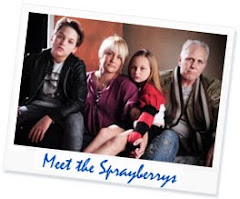With respect to focusing on the business at hand, that is, making film, we have a few family guidelines we try to follow and they seem to be working well:
First there are the basics for the kids- the manners and common sense you'd teach at home anyway
- Show up on time - remember, no person's time is more valuable than another's
- Use manners - look people in the eye, say "please" and "thank you"
Then there are some things that make the kids stand out so that people want to work with them again
- Be theatrically prepared and run lines beforehand
- Listen - not only to the director during the scene, but also in down time with the studio teacher and other adults.
- Ask smart questions - don't just talk to be heard; think about what you want answered
And then, of course, there is safety
- Don't run or play unless it's in the scene - sets can be dangerous
- Don't wander off
- Make sure someone knows where you are at all times - your parent and/or your Studio Teacher
There are also some things we can do as parents:
- Document your hours and make notes for your manager
- Because the children are young and learning, we've found it helpful to kindly and, when appropriate, ask the leads they are working with to please give the kids direction - so far so good.
- We also ask the director to please inform us if we may be of assistants in any way.
- We watch the kids, as this is a parent's role on set, however we are not front and center where they can see us at every moment. They know we are there if they need us (and it is important to always make this the case so that they do not have that stress or worry), but not being right in front of them allows them to work independently and develop confidence. Basically put, we aren't "side-line coaches," so we attempt to blend in while being available to the kids and the set team.
- We focus on takes and listen for when the children are praised and also for when we have questions we want to ask later (to acting coaches, other professionals, etc) ultimately as a way of learning ourselves
In regards to schooling:
- We come prepared with assignments
- We establish clarity with the set teacher regarding the school assignments that the children have (they are home schooled)
- If necessary, we teach the kids ourselves later to make up for a concept that was missed/unclear on set.
Lastly, we all have fun and respect the work we're so thrilled to have been given!

.jpg)
2 comments:
Hi Carl, it was a pleasure working with Dylan. I've never worked on a film that involves kids so I was wondering if some of these child actors can be little brats, but I was really impressed by how polite and nice Dylan was! And Ellery was really sweet too. (By the way, I found your blog googling Dylan's name.)
Good for people to know.
Post a Comment